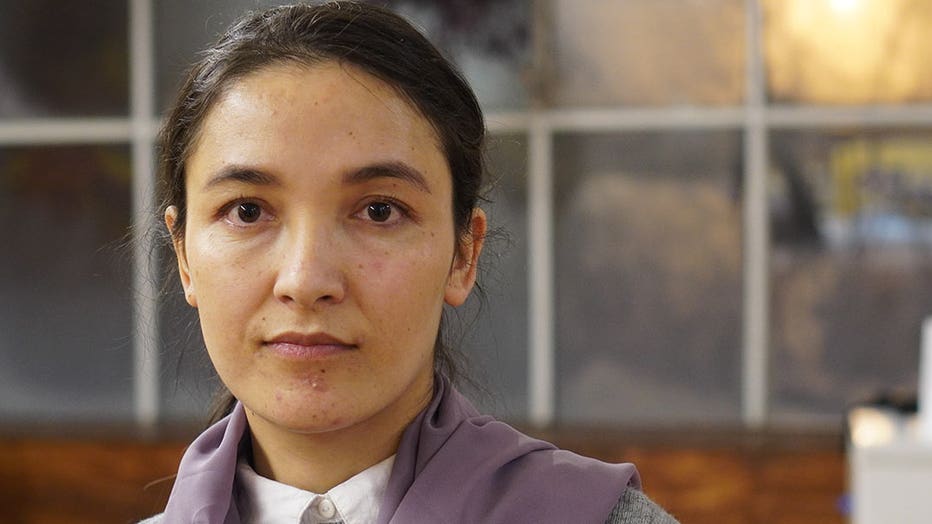Afghan refugees celebrate solstice in Minneapolis; hope for more secure future in US
Traditional Afghan food as part of a Shab-e-Yalda, a ceremony celebrated the night of the winter solstice, at the Afghan Cultural Society in Minneapolis. (FOX 9)
MINNEAPOLIS (FOX 9) - Afghans from across the Twin Cities metro gathered Wednesday night to celebrate a winter solstice holiday and their community, just as many of its most recent members are facing renewed anxiety about having to face death or persecution if they have to return to their homeland.
About 50 people came to the Afghan Cultural Society’s (ACS) event commemorating Shab-e-Yalda, a solstice festival with roots in the Zoroastrianism religion in which families gather on the longest, darkest night of the year to eat, dance and read poetry to each other until dawn. It's celebrated in areas once covered by the ancient Persian empire, including Iran, Afghanistan, and parts of Iraq and Turkey.
Nasreen Sajady, co-founder and advocacy director at ACS, explained most of the men, women and some children who talked, danced and played chess together Wednesday night had arrived relatively recently in Minnesota, having fled or been evacuated from their homeland after the Taliban took over last August following the withdrawal of U.S. troops.
They came to the United States with temporary two-year visas called "humanitarian parole," set to expire next summer. The Afghan Adjustment Act, a bill introduced in August by a bipartisan group of senators including U.S. Sen. Amy Klobuchar, D-Minn., would have granted them green cards — but it was dropped from Congress’ omnibus spending bill this week.
The result: Afghan refugees, including many who had worked with U.S. troops or the U.S. government, have been left in immigration limbo.
"The unknown is s very scary. They don't know if they're going to be here. They don't know if they're going to be sent back, and we get calls regularly," Sajady said. "People are very anxious about this — for their physical health, for their mental health. It is just extremely important that we do whatever we can to get this bill passed."
The Afghan Cultural Society is asking supporters to call Senate leaders, including Majority Leader Church Schumer, to ask them to take up the bill again.
‘My life would be in danger'
Zahra Wahidy understands the urgency more than most. Had she not left the country in September 2021, she would likely have been targeted by the Taliban for at least three reasons:
- She is a woman who worked as a journalist/reporter
- She went on to work as a researcher for USAID, helping to evaluate projects
- She is Hazara, a largely Shia Muslim ethnic group that the Taliban has a long history of violently oppressing and persecuting

Zahra Wahidy, a former Afghan journalist who worked as a researcher for USAID, fled her homeland after the Taliban retook the county last August. She now lives in Minnesota on a temporary visa and fears she will be killed if she is forced to return t
She initially fled to a refugee camp in the United Arab Emirates before coming to Minnesota four months ago on a humanitarian parole visa. She had applied for a visa that has a path to residency — a program for Afghans who worked for the U.S. government — more than a year ago but hasn’t received any recent updates, and she can’t apply for asylum while that application is still pending.
When she heard about the Afghan Adjustment Act, it gave her hope she might be able to get residency in the U.S. Now, if nothing changes, she will have to return to Afghanistan when her temporary visa expires.
"I cannot even imagine that one day I go to Afghanistan. We see every day that the situation gets worse, especially for women… I cannot see myself alive there. I cannot because if they know that I worked with USAID and if they know that I was a journalist, my life would be in danger."
Veteran support and another blow
Manuel Mancha, a former U.S. Marine from Minneapolis who served in Afghanistan, also attended the Shabe Yalda festivities. Numerous veteran groups lobbied for the act, describing it as a way for the US to give something back to the thousands of Afghans who risked their lives to work with U.S. troops.
Mancha also sees the act as a small step the U.S. can take to "make right" the mistakes it made during the war.
"It would give more short-term stability, but also intergenerational stability for the children, to the elders that have come into the United States looking for refuge," he said. "And it's part of starting at the very minimum.. a bedrock for reparations."
While the mood at the event was upbeat, the act's failure in Congress wasn't the only disappointing news on people's minds. On Tuesday, the Taliban announced that women would be banned from all universities in Afghanistan.
"There was something I read — someone had posted it and it was saying that being an Afghan is like getting your heart punched every single day. Every single day we wake up, there is a blow. So that's what it feels like. It feels like another blow. And we just have to continue being resilient for over 40 years of blows," Sajady said.

